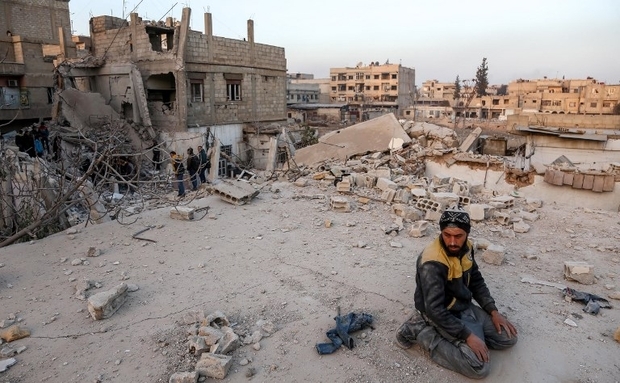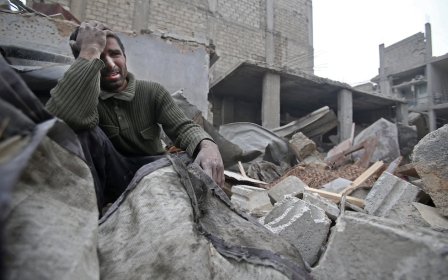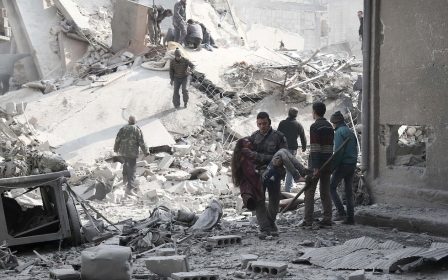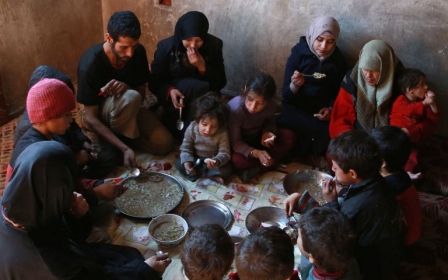Death toll soars as Syria government pounds rebel enclave

Fresh government strikes killed 31 civilians, including five children, on Wednesday in a rebel-held enclave near Damascus where overwhelmed medics were still treating the survivors of the Syrian conflict's bloodiest day in months.
The district of Eastern Ghouta, controlled by rebel factions, suffered some of its worst bloodshed in years on Tuesday and the toll continued to mount overnight.
"The civilian toll is now 80. Two wounded people died after midnight," said Rami Abdel Rahman, head of the Syrian Observatory for Human Rights.
"This was the highest civilian toll in Syria in nearly nine months, and one of the bloodiest days for Eastern Ghouta in several years," the head of the Britain-based monitoring group told AFP.
Nineteen children and 20 women are among the dead, and around 200 were wounded.
There was no respite for Ghouta residents as government warplanes returned on Wednesday morning and carried out strikes that killed 15 civilians and wounded dozens.
Eight were killed in the town of Hammuriyeh, four in the town of Beit Sawa, and three in the main town of Douma, the Observatory said.
Civilians had been bracing for more raids as the government appeared intent on ratcheting up the pressure on Eastern Ghouta, a rebel pocket on the capital's doorstep.
"Please break up all gatherings and clear the streets," blared an announcement from mosque minarets in Douma.
Surrounding areas and villages had been heavily battered by raids on Tuesday, flooding Douma's hospitals with wounded children.
Home to an estimated 400,000 people, the Eastern Ghouta region has been included in a de-escalation deal that was meant to bring calm to several zones across the country.
'Chlorine' use in Syria
But bombardment there has increased in recent days, including with suspected chlorine-filled munitions.
On Wednesday, French Foreign Minister Jean-Yves Le Drian said that "all indications" pointed to the Syrian government's use of chlorine weapons in Syria.
"All indications... tell us today that chlorine is being used by the regime at present in Syria," he told BFM television.
Chlorine is suspected of having been used on two occasions this month alone on Eastern Ghouta.
The US State Department said on Monday it had recorded six suspected chemical attacks in Syria in the past 30 days.
Syria has repeatedly denied using chemical weapons. On Wednesday, Syria's army intercepted an Israeli attack on a military position in Jamraya, northwest of Damascus.
Jamraya is home to several military positions and a branch of the Syrian Scientific Studies and Research Center (SSRC), suspected of playing a leading role in chemical weapons production.
An Israeli air strike hit the facility in May 2013.
"This morning, Israeli warplanes fired several missiles from Lebanese airspace on one of our military positions in the Damascus countryside," said an army statement carried by state media.
"Our air defence systems blocked them and destroyed most of them."
The Observatory said an arms depot in Jamraya had been hit, but it could not confirm whether research facilities had been damaged.
'Breaking point'
The United Nations has said it is looking into reports of chemical attacks in Syria, and called on Tuesday for a month-long ceasefire across the country for civilians' sake.
The de-escalation zones, according to the UN's regional humanitarian coordinator for Syria, were not doing enough to stem the violence.
"There is a misperception that de-escalation areas have resulted in peace and stability," Panos Moumtzis told reporters in Beirut.
"Eastern Ghouta is as de-escalation area. If anything, there has been a serious escalation... The conflict in Syria is far from over," Moumtzis said.
The situation had grown more dire than ever because of the multiple fronts raging at the same time.
"It's the first time - between Eastern Ghouta, Idlib, Afrin - we have multiple fronts with people in extreme danger without a view to a solution," he said.
"Now, we feel we've reached a breaking point."
On Wednesday, Syrian Kurdish fighters accused the Turkish army of shelling a primary school and a water plant in Syria's northern Afrin region.
Nouri Mahmoud, spokesman of the Syrian Kurdish YPG militia, said Turkish forces and their Syrian insurgent allies damaged the water plant that supplies Afrin city. They also shelled a primary school in the Maydanki village a day earlier, but the artillery caused no casualties, he said.
US-led coalition announces strike in Deir Ezzor
The US-led coalition battling IS announced on Wednesday it had carried out air strikes in the eastern Deir Ezzor region against Syrian pro-government forces.
"Syrian pro-regime forces initiated an unprovoked attack against well-established Syrian Democratic Forces headquarters" on 7 February, CENTCOM said in a statement.
"Coalition service members in an advise, assist, and accompany capacity were co-located with SDF partners during the attack eight kilometers east of the agreed-upon Euphrates River de-confliction line," the statement said.
Using an alternative acronym for IS, the coalition said it then "conducted strikes against attacking forces to repel the act of aggression against partners engaged in the Global Coalition's defeat-Daesh mission."
The statement did not say whether the incident caused casualties.
New MEE newsletter: Jerusalem Dispatch
Sign up to get the latest insights and analysis on Israel-Palestine, alongside Turkey Unpacked and other MEE newsletters
Middle East Eye delivers independent and unrivalled coverage and analysis of the Middle East, North Africa and beyond. To learn more about republishing this content and the associated fees, please fill out this form. More about MEE can be found here.




